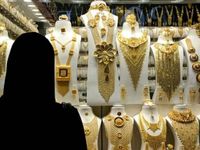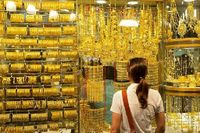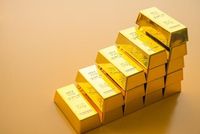Dubai, UAE: The gold market in the United Arab Emirates (UAE) is experiencing significant fluctuations, driven largely by geopolitical tensions and economic policies. On April 11, 2025, the Dubai Jewellery Group reported that 24-carat gold opened at Dh386.5 per gram, reflecting a Dh10 increase from the previous day's opening rates. Prices for other purities also saw notable rises, including 22-carat gold at Dh358 per gram and 21-carat gold at Dh343.25 per gram, marking increases of Dh9.25 and Dh8.75 respectively.
This recent surge in gold prices follows a week of volatility in global markets, primarily influenced by US President Donald Trump's announcement of a 125 percent tariff on Chinese imports, despite a temporary pause on tariffs for other countries. The announcement led to a brief drop in gold prices earlier in the week, with some residents seizing the opportunity to invest, making profits of up to Dh1,200 in just 24 hours.
According to the Dubai Jewellery Group, the price of 24-carat gold had reached Dh374.50 per gram by the evening of April 10, up from Dh370.50 the previous day. This increase was part of a broader trend, as gold prices surged by Dh4 per gram in just one trading day. The fluctuations in gold prices are reflective of ongoing market uncertainties, including fears of inflation and trade tensions between the US and China.
On April 10, gold hit an all-time high of AED 11,650 ($3,186) per ounce, a remarkable increase attributed to the complex dynamics of global trade and economic conditions. James Campion, a popular investor at eToro, noted that the price of spot gold climbed back above AED 11,300 per ounce, trading around AED 11,500 by late afternoon. This increase represents a 19.22% return year to date, highlighting gold's resilience amid market volatility.
Investor interest in gold has surged, with global gold-backed exchange-traded funds (ETFs) seeing inflows of US$21 billion (226 tonnes) in the first quarter of 2025, marking the second-highest quarterly inflow ever recorded. This heightened demand underscores the precious metal's status as a safe haven during periods of economic uncertainty.
In the UAE, over a third of the country's imports consist of gold reserves, solidifying its position as a key player in the global gold trade. The primary markets for the UAE include India, Switzerland, and the USA, with gold imports reaching a substantial $20 billion in 2019. Consumer purchases of jewelry account for nearly half of all gold transactions in the UAE, with institutional investors and banks also playing a pivotal role by acquiring substantial amounts of gold during economic uncertainty.
Despite the domestic production of gold, the UAE relies heavily on global markets to meet its supply requirements, supplementing imports primarily from Africa and Europe. The ongoing transition from physical gold to digital investments may present challenges to the UAE's position as a prominent trading hub for precious metals. Fluctuations in oil prices and concerns regarding global economic growth could also impact demand for gold products.
The recent price movements are indicative of a broader trend in the gold market, where geopolitical factors and economic policies are increasingly influencing investor behavior. As tensions between the US and China escalate, the demand for gold as a safe-haven asset is likely to continue, providing a robust foundation for its prices.
In summary, the gold market in the UAE is navigating through a period of significant change, driven by both local and global factors. As residents keep a close eye on gold rates, the market's trajectory remains uncertain, influenced by the interplay of economic policies, geopolitical tensions, and shifting investor sentiments.







